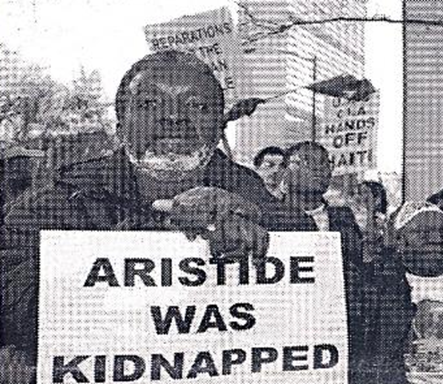"The Debate over Aristide’s Presidency and Ouster" by Dimmy Herard
Herard is a doctoral candidate in the Department of Politics and International Relations at Florida International University. His dissertation will examine democracy and politics in Haiti.
On 7 February 2001, Jean-Bertrand Aristide returned once more to the National Palace as Haiti’s elected president. His new term, however, was marred by controversy. As political opponents, who included many former allies who had since broken from Aristide’s party, Fanmi Lavalas, pointed to irregularities in the May 2000 legislative elections, Fanmi Lavalas won control over parliament, resulting in a one-party majority. Boycotting the 2000 presidential election that Aristide won, the opposition formed an alternative government named the Convergence Démocratique (CD).
In 2003, CD gained support from the "Groupe des 184" (G184), an amalgamation of 184 individuals, enterprises, and organizations—led by businessmen Andy Apaid, Jr., and Reginald Boulos—staunchly opposed to Aristide and Fanmi Lavalas. For the next three years, Haiti became engulfed in political deadlock while the economy rapidly declined, in part due to the United States withholding of aid, because it believed that Aristide and Fanmi Lavalas were mostly responsible for the political impasse.
The impasse was finally broken on 29 February 2004 when a paramilitary organization made up of ex-soldiers and gangs, led by a former police chief, Guy Philippe, took over Haiti’s capital city, and Aristide boarded a United States plane, which took him into exile to the Central African Republic. The events that led to Aristide’s ouster have been widely debated ever since. Authors like Paul Farmer, Peter Hallward, and Jeb Sprague believe that the G184 ultimately served the interests of corporate America, while the United States withheld aid and overlooked, and even condoned, the G184 and CD’s decision not to cooperate with Haiti’s elected president and Fanmi Lavalas. Authors like Randall Robinson even believe that Aristide was "kidnapped" the day he was taken aboard the United States plane that took him into exile. Other scholars, like Alex Dupy and Robert Fatton, however, believe that Aristide was at least partially responsible for his own downfall, because he was unable or unwilling to maintain traditional alliances with groups like the Organisation du peuple en lutte (OPL). Also, Aristide had alienated Haiti’s powerful business community by encouraging the United Nations embargo between 1993 and 1994 and then resisting liberal trade reforms that the United States introduced as a condition for its military intervention to restore Aristide to power in 1994. Meanwhile, authors like Michael Deibert contend that many Haitians became discontented with Aristide because he employed street gangs, known as chiméres, to intimidate and eliminate not only political opponents, but also former allies who had wavered in their loyalty. Aristide is also believed to have been involved in a telecommunications money-laundering scandal.

